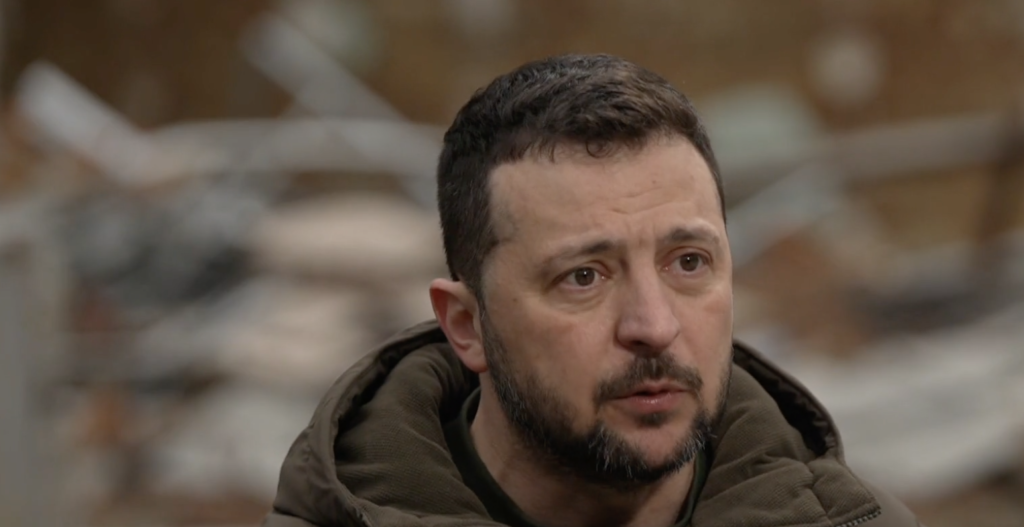Landman Is in Love With the Myths That Oilmen Tell About Themselves
Landman, the new drama series on Paramount+, opens with protagonist Tommy Norris (Billy Bob Thornton) tied to a chair and surrounded by members of a Mexican drug cartel. He’s trying to get them to sign away their land so that the oil company he works for can drill there. Despite his compromised position, he’s able to sway his captors by rattling off an apparently convincing series of facts and figures. A few minutes later, Tommy’s young son Cooper (Jacob Lofland) is picked up in a big pickup truck for his first day on a crew of rig hands. When they make a pre-dawn stop at a roadside coffee stand staffed by a beautiful blond in a bikini top, Cooper orders a latte and gets skewered by his crewmates and the column of honking trucks behind them.It’s a fitting introduction to Landman: a world where smart, gruff men are always right, and those attached to liberal cultural signifiers are always wrong. As eye-rolling as that is, the show is painting a relatively accurate picture in at least one respect. This is how plenty of middle- and upper-management oil and gas men talk and think, too. Of course, the show doesn’t bother to tell the audience that the myths these men tell about themselves are just that: elaborate, often paranoid fabrications.Norris is a “landman” for a fictional company called M-Tex. In real life, landmen mostly deal with getting signatures and handing out checks. Norris is something closer to an Olivia Pope–style fixer, acting as the all-seeing middle layer between CEO Monty Miller (Jon Hamm) and the crews getting their hands dirty on the patch. The latest offering from Yellowstone creator Taylor Sheridan, the show was co-created with writer Christian Wallace, whose podcast Boomtown is an excellent crash course in the fascinating, dangerous, and slightly freewheeling world of West Texas’s oil and gas industry. Landman, though, is above all a Sheridan production. At least 10 minutes of each episode—and sometimes significantly more—is spent inviting the audience to ogle at Tommy’s ex-wife (Ali Larter) and teenage daughter (Michelle Randolph, who is 27 years old). The camera lingers on their bodies. There is a long-running bit about Tommy’s dweeby lawyer roommate being unable to concentrate in his home office as these women thrust their pelvises into the air, shake their asses, and smear Crisco on themselves poolside. Tommy also repeatedly refers to his daughter’s good looks, at one point calling her “hotter than a two-dollar Rolex” to the high school quarterback he’s just punched in the throat for having sex with her. Between the bog standard misogyny and soap opera hi-jinx are overwrought Aaron Sorkin–style speeches that set Tommy and Monty up to get the last word, usually against some out-of-touch elite. The irony propelling Landman is that plenty of wealthy oilmen really do think of themselves as Sheridan-esque heroes: tough-talking traditionalists who hate all things “woke” and believe they understand how things work in the “real” world, even if they spend most of their days in C-suites, conference centers, and country clubs. You can imagine that there are indeed oil executives who would confidently—and wrongly—assert, as Monty does, that Saudi Arabia and Russia are the “biggest bankers” of “green initiatives” because that’s a way for them to manipulate the price of oil, just like they’ve been doing “since they were harvesting sorghum from the fields of the Nile River Valley.”Such nonsense abounds in Landman. Tommy at one point explains to a big-city lawyer that the wind farms used to power drilling operations are plenty dirty, and will take more than 20 years to “offset the carbon footprint of making it” thanks to all the concrete and diesel involved in turbine production and shipping. That’s not true; wind turbines typically offset the carbon used to produce them in a matter of weeks or months, not years. That didn’t stop the clip from going viral on the right as a bit of folksy wisdom that every “left-winger should have their eyes held open and be forced to watch,” as one Red State writer put it. Tommy’s wind turbine rant is one of many—on the evils of California, his daughter’s virginity, and why cigarettes don’t cause lung cancer. He is frequently wrong, that is, in a show that constantly insists he’s right. He goes to the hospital, for instance, after accidentally bludgeoning his pinkie while tending to a well blow-out; while there, he declines to have it re-attached and instead cuts off the dangling chunk of finger with a pocket knife. He then leaves the hospital before letting medical professionals stitch up the open wound, risking a staph infection so that he can get back to work. Doctors are just another genre of egghead, liberal-coded expert for Tommy to defy, and he suffers no consequences for doing so.And yet there’s something entertaining about watching Landman’s characters painfully fumble through life. Some of Thornton and Hamm’s most memorable roles (in Bad Santa and Mad Men,

Landman, the new drama series on Paramount+, opens with protagonist Tommy Norris (Billy Bob Thornton) tied to a chair and surrounded by members of a Mexican drug cartel. He’s trying to get them to sign away their land so that the oil company he works for can drill there. Despite his compromised position, he’s able to sway his captors by rattling off an apparently convincing series of facts and figures. A few minutes later, Tommy’s young son Cooper (Jacob Lofland) is picked up in a big pickup truck for his first day on a crew of rig hands. When they make a pre-dawn stop at a roadside coffee stand staffed by a beautiful blond in a bikini top, Cooper orders a latte and gets skewered by his crewmates and the column of honking trucks behind them.
It’s a fitting introduction to Landman: a world where smart, gruff men are always right, and those attached to liberal cultural signifiers are always wrong. As eye-rolling as that is, the show is painting a relatively accurate picture in at least one respect. This is how plenty of middle- and upper-management oil and gas men talk and think, too. Of course, the show doesn’t bother to tell the audience that the myths these men tell about themselves are just that: elaborate, often paranoid fabrications.
Norris is a “landman” for a fictional company called M-Tex. In real life, landmen mostly deal with getting signatures and handing out checks. Norris is something closer to an Olivia Pope–style fixer, acting as the all-seeing middle layer between CEO Monty Miller (Jon Hamm) and the crews getting their hands dirty on the patch. The latest offering from Yellowstone creator Taylor Sheridan, the show was co-created with writer Christian Wallace, whose podcast Boomtown is an excellent crash course in the fascinating, dangerous, and slightly freewheeling world of West Texas’s oil and gas industry.
Landman, though, is above all a Sheridan production. At least 10 minutes of each episode—and sometimes significantly more—is spent inviting the audience to ogle at Tommy’s ex-wife (Ali Larter) and teenage daughter (Michelle Randolph, who is 27 years old). The camera lingers on their bodies. There is a long-running bit about Tommy’s dweeby lawyer roommate being unable to concentrate in his home office as these women thrust their pelvises into the air, shake their asses, and smear Crisco on themselves poolside. Tommy also repeatedly refers to his daughter’s good looks, at one point calling her “hotter than a two-dollar Rolex” to the high school quarterback he’s just punched in the throat for having sex with her.
Between the bog standard misogyny and soap opera hi-jinx are overwrought Aaron Sorkin–style speeches that set Tommy and Monty up to get the last word, usually against some out-of-touch elite. The irony propelling Landman is that plenty of wealthy oilmen really do think of themselves as Sheridan-esque heroes: tough-talking traditionalists who hate all things “woke” and believe they understand how things work in the “real” world, even if they spend most of their days in C-suites, conference centers, and country clubs. You can imagine that there are indeed oil executives who would confidently—and wrongly—assert, as Monty does, that Saudi Arabia and Russia are the “biggest bankers” of “green initiatives” because that’s a way for them to manipulate the price of oil, just like they’ve been doing “since they were harvesting sorghum from the fields of the Nile River Valley.”
Such nonsense abounds in Landman. Tommy at one point explains to a big-city lawyer that the wind farms used to power drilling operations are plenty dirty, and will take more than 20 years to “offset the carbon footprint of making it” thanks to all the concrete and diesel involved in turbine production and shipping. That’s not true; wind turbines typically offset the carbon used to produce them in a matter of weeks or months, not years. That didn’t stop the clip from going viral on the right as a bit of folksy wisdom that every “left-winger should have their eyes held open and be forced to watch,” as one Red State writer put it.
Tommy’s wind turbine rant is one of many—on the evils of California, his daughter’s virginity, and why cigarettes don’t cause lung cancer. He is frequently wrong, that is, in a show that constantly insists he’s right. He goes to the hospital, for instance, after accidentally bludgeoning his pinkie while tending to a well blow-out; while there, he declines to have it re-attached and instead cuts off the dangling chunk of finger with a pocket knife. He then leaves the hospital before letting medical professionals stitch up the open wound, risking a staph infection so that he can get back to work. Doctors are just another genre of egghead, liberal-coded expert for Tommy to defy, and he suffers no consequences for doing so.
And yet there’s something entertaining about watching Landman’s characters painfully fumble through life. Some of Thornton and Hamm’s most memorable roles (in Bad Santa and Mad Men, respectively) are about damaged, charming people who willfully destroy their own lives and those of the people around them. Landman understands their unique charms as actors and misses the pathos that could turn Tommy and Monty into something other than smug jerks.
That they are smug jerks, however, is central to the fact that they also don’t seem great at their jobs. Within a matter of hours, Tommy oversees both a deadly well blowout and a stolen truck crashing into a cartel-owned plane full of cocaine, which we’re led to believe is just the type of thing that happens in the Permian Basin. (It’s not.) Meanwhile, Monty gives $300 million to an entrepreneur who wants to drill some 300 wells in West Texas’s Val Verde Basin, and who came to him because “private banks won’t touch fossil fuels anymore”; such wells can cost $5 million a pop and might barely break even in the first year, making Monty’s investment a potentially very reckless one. Landman is quick to pass judgement on sex workers, gold-digging ex-wives, and cheating husbands, but (at least for now) never on Tommy and Monty.
In that way, Landman is true to life: an accurate representation of oil industry bosses’ own delusional self-aggrandizement. In public and private, executives blame everyone but themselves for real or imagined misfortune—from radical climate activists to Democrats to banks who’ve allegedly stopped financing fossil fuels because they’ve gone woke. But contrary to the entrepreneur who pitches Monty, Wall Street still generously finances oil and gas drilling. What really happened in the Permian Basin is that investors who freely handed out cash during the shale boom had, by 2020, started to lose patience with drillers who’d spent the better part of a decade torching their cash without turning a profit. It’s rare, in real life, for executives to admit they were terrible stewards of capital who’ve been forced to get their balance sheets in order to stay in business. And Landman portrays that lack of accountability faithfully.
It’s to Landman’s credit that it isn’t pure hagiography for the industry itself, and showcases some of the lesser-known, thoroughly unglamorous aspects of life in the Permian: the dangerous roads that criss-cross oilfields; the obscene wealth that courses through Midland, and more rough-and-tumble mancamps in neighboring Odessa; the fact that the oil and gas business is often less about drilling than land arbitrage. Perhaps that’s why the American Petroleum Institute—an oil and gas industry trade association, funded by M-Tex’s real-world counterparts—runs ads on the Paramount+ stream insisting that fossil fuel companies are good, law-abiding corporate citizens who would never violate OSHA rules or fail to report stolen trucks helping ferry drugs into the United States.
Yet a central myth of Landman is one that groups like API have spent millions of dollars promoting: that the oil and gas industry is one big, if occasionally dysfunctional family of working stiffs humbly devoted to meeting consumer demand. If that were the case, then oil companies and the trade associations they fund wouldn’t spend millions of dollars a year fighting fuel efficiency regulations and bankrolling Republicans to block anything called climate policy. Naturally, that story does not get told in Landman. It’s a soap opera, after all. But its oilmen do say realistically stupid things and make realistically stupid decisions—and that’s certainly more fun to watch on TV than in real life.



